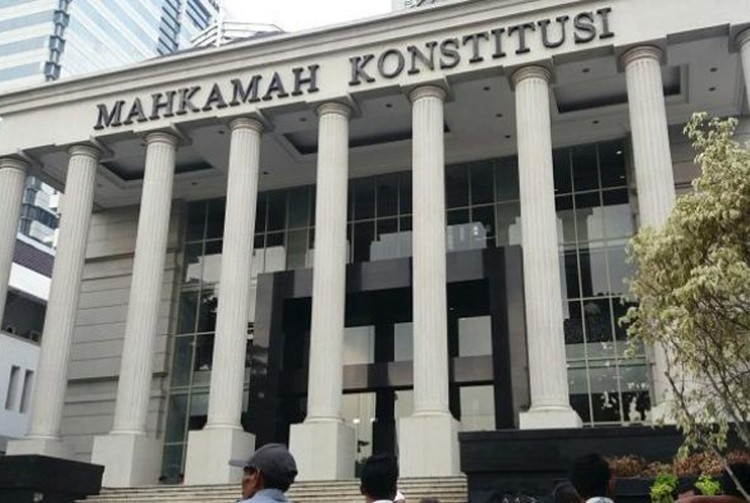Popular Reads
Top Results
Can't find what you're looking for?
View all search resultsPopular Reads
Top Results
Can't find what you're looking for?
View all search resultsKPK Law revision violates democratic values: Ex-justice
Change text size
Gift Premium Articles
to Anyone
T
he controversial revision to the Corruption Eradication Commission (KPK) Law violates several democratic values upheld by the country, former Supreme Court chief justice Bagir Manan told the Constitutional Court during a hearing on Wednesday.
Bagir, also a constitutional law professor at Padjadjaran University in Bandung, West Java, was summoned to give an expert statement regarding a judicial review petition challenging the revised KPK Law filed by seven different groups.
The former justice was brought by a group of petitioners consisting of former KPK commissioners, namely Agus Rahardjo, Laode Muhammad Syarif and Saut Situmorang.
Bagir testified that President Joko “Jokowi” Widodo and the House of Representatives had largely ignored mounting opposition to the revision while it was being deliberated.
The revision, which was passed by the legislative body in October last year, triggered massive demonstrations in Jakarta and other regions, with protesters saying the law had taken the independence out of the antigraft body and stripped away most of its power.
“Many voices from the public at large, academics, mass media and experts demanded [the President and the House] to stop deliberating the revision and keep the law as is,” Bagir testified during Wednesday’s hearing. “However, neither the House nor government responded to the public’s opinion.”
Apart from the protests, hundreds of thousands of people signed petitions demanding the House revoke the revision, including a petition started by a Yogyakarta’s Gadjah Mada University lecturer that received around 2,300 signatures from lecturers of 33 universities.
The former justice said public opinion should be an essential consideration in writing laws, even though the country used a representative democratic system through the election of legislators. He added that public participation should also still be encouraged.
Bagir added that the short deliberation time of the revision indicated that the House and government rushed the bill and did not deliberate it prudently. It took only 12 days from the initial meeting to the day the House passed the bill.
“It also shows a lack of openness and transparency, which limits public participation. This went against efforts to eradicate corruption.”
He highlighted that only 102 lawmakers attended the plenary meeting in which the bill was passed, which was less than the required quorum – although 289 House members signed the attendance list.
Bagir said the law should not be valid if this fact could be proven, as it violated the procedure for drafting and passing legislation.
The petitioners also invited Aan Eko Widiarto, a constitutional law expert from Brawijaya University in Malang, East Java, to give testimony during Wednesday’s hearing.
Aan highlighted that the KPK Law revision was on the House’s 2019 open cumulative list– meaning that the government or House could promote it to be deliberated, although it was not included in the National Legislation Program.
Bills are put on the open cumulative list if they are related to international treaties, state budget, changes in the regional administrative area, the establishment and revocation of a regulation in lieu of law (Perppu), as well as a Constitutional Court ruling.
Although the Constitutional Court ordered the government and House to revise the KPK Law and put the antigraft body under the executive branch in 2017, Aan said the bill’s academic script failed to address the court ruling. This should have hindered the House and the government from pushing the deliberation of the bill.
Moreover, he added that the submitted academic script should not be valid as it failed to address at least six points included in the revised law, including the role of the newly established supervisory council.
Many criticize the board for reducing the antigraft body’s independence, as graft busters would need to wait for its approval prior to carrying out wiretapping, raids and the seizure of items.
Presiding Justice Anwar Usman adjourned the hearing until July 14, when the petitioners will propose more experts to testify.










